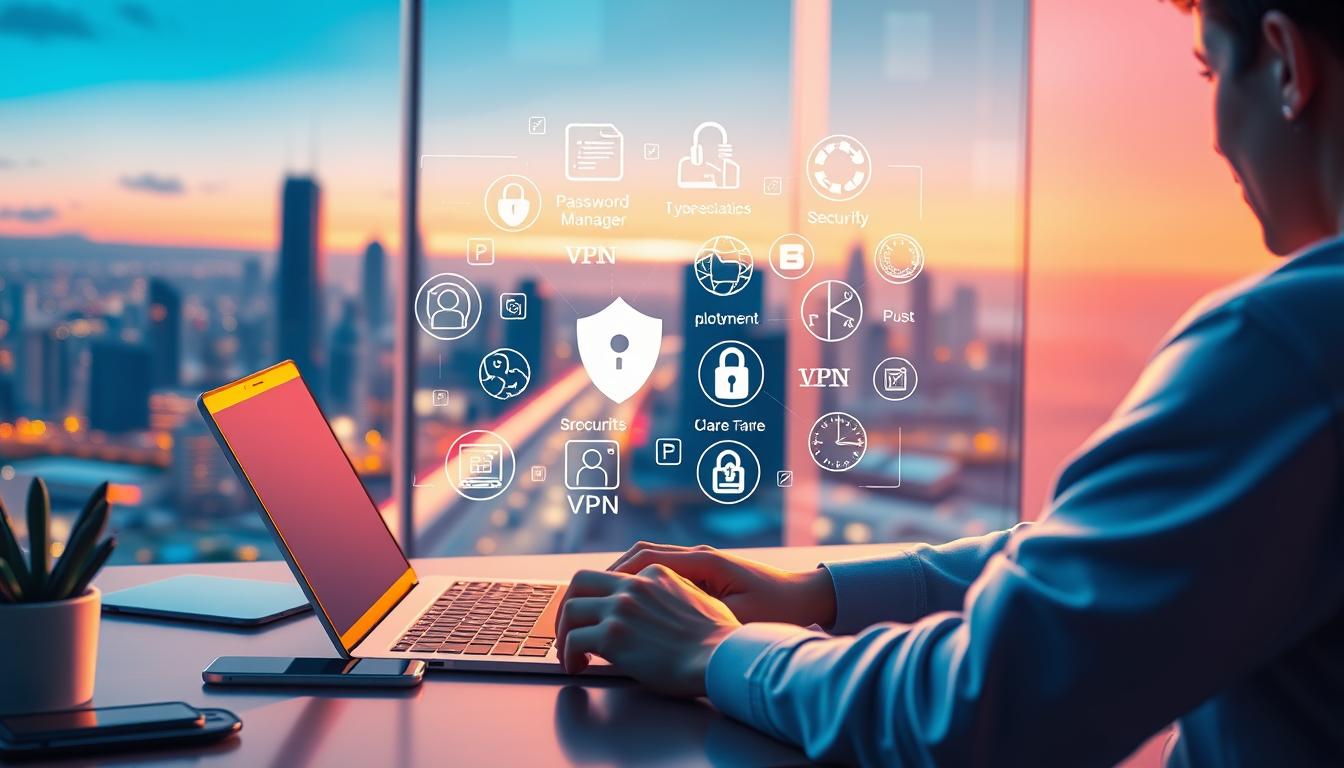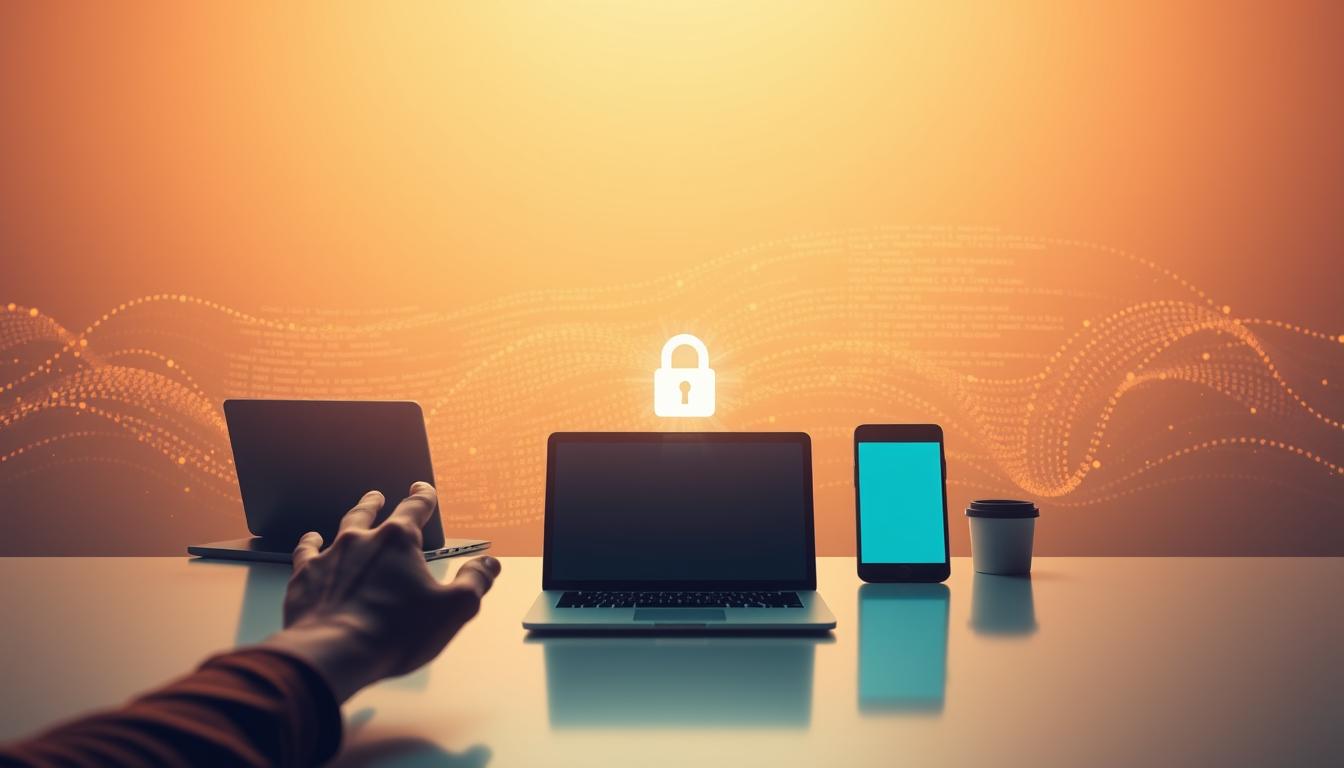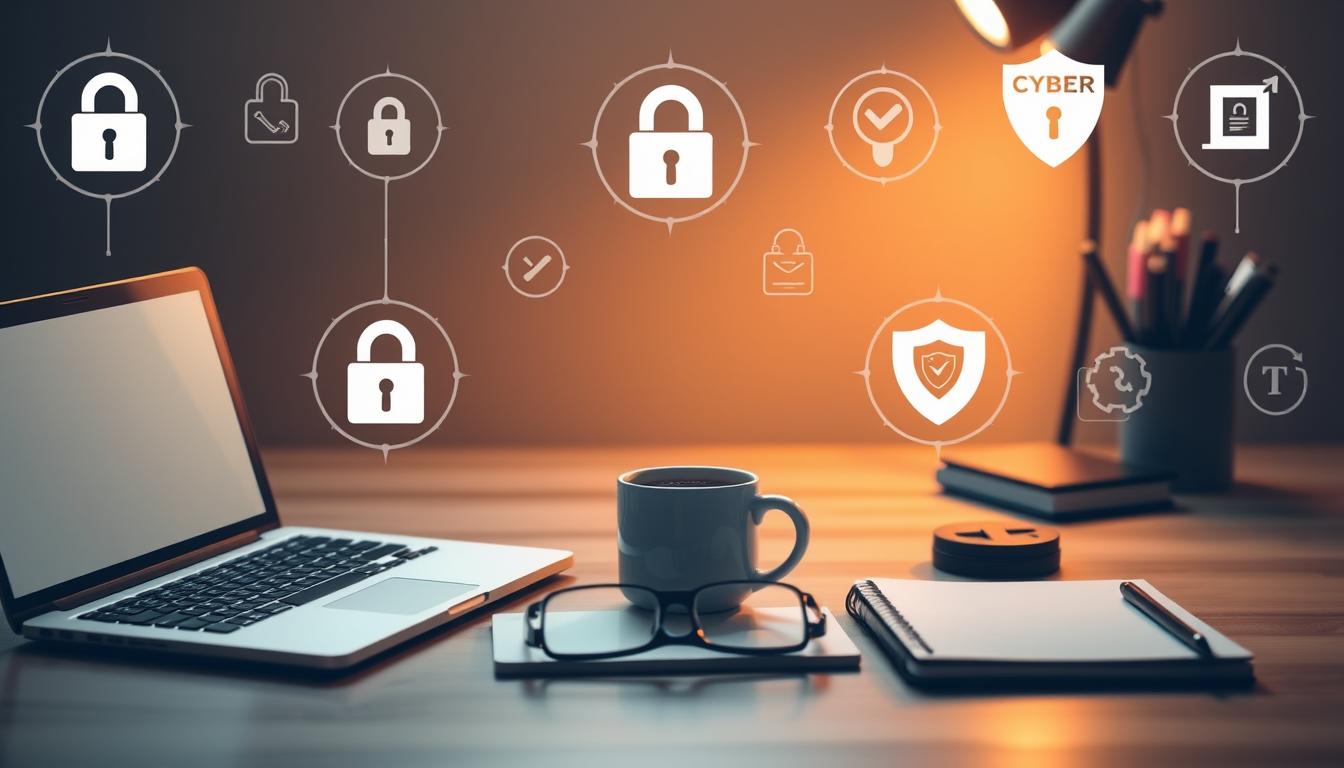In today’s digital world, cyber threats are always lurking. It’s important to keep your online safety up to date. Cyber hygiene is about the daily steps you take to protect your devices and online identity from hackers and scams.
By following these simple tips, you can strengthen your online security without needing any special skills. Let’s explore the key practices to keep your online presence safe.

Key Takeaways
- Cyber hygiene is essential for protecting your personal information.
- Daily habits can help defend against various cyber threats.
- Implementing simple practices improves your overall online security.
- Maintaining internet safety tips is crucial in a digital world.
- No technical skills are required to adopt effective cyber hygiene.
Understanding Cyber Hygiene
Keeping your online security safe is key in today’s digital world. So, what is cyber hygiene? It’s about the steps you take to protect your personal data from online threats. It’s all about good cyber habits that keep you safe from cybercrimes.
Cyber hygiene uses many methods to keep your data safe. It helps you spot and avoid dangers like malware, phishing, and data breaches. Knowing about these threats is crucial for a strong defense against online dangers.
Knowing what good cyber habits are helps you stay safe online. Simple actions like using strong passwords, updating software, and being careful when browsing can really help. Learning these habits helps you make smart choices, keeping you and your data safe.

Why Daily Cyber Hygiene Practices are Important
In today’s digital world, keeping your online space safe is key. Cyber threats are always changing, so having a daily cybersecurity checklist is essential. By following regular practices, you can protect your online presence and stay ahead of threats.
Cybercrime is on the rise, with more data breaches and hacking incidents. These dangers can hit anybody, at any time. By being proactive along with your cyber cleanliness, you lower your chance of falling victim. Small, daily actions can build a strong defense against online dangers.
Adding daily habits to your routine boosts your online safety. Remaining caution and mindful of dangers is crucial. Knowing the value of cyber hygiene helps you navigate the digital world safely.
Daily Cyber Hygiene Practices for Online Safety
To keep your digital life safe, it’s key to follow daily habits. These habits include keeping your software up to date, using strong passwords, and turning on two-factor authentication.
Updating Software and Applications
Keeping your software and apps updated is crucial. It helps protect against security threats. Set updates for upgrades to keep your gadgets safe. Some apps update automatically, which is a big help for your safety.
Implementing Strong Password Practices
Strong passwords are vital for account security. Use different passwords for each site to avoid trouble if one is hacked. A password manager can help you create and store complex passwords easily. This is a basic step in keeping your online world safe.
Enabling Two-Factor Authentication
Two-factor affirmation (2FA) incorporates an extra layer of security. It makes it harder for programmers to urge into your accounts. Many services offer 2FA, like SMS codes or apps. Turn it on for all important accounts to boost your safety.

Secure Browsing Routines
Keeping your browsing safe is key for online security. Knowing how to spot suspicious links and sites helps avoid phishing. Being alert and making smart choices online keeps your info safe.
Avoiding Suspicious Links and Websites
Always check links before you click. Look for any misspellings or odd domain names. Real sites have HTTPS in their URL, showing they’re secure.
If you’re not sure about a site, do some research or use trusted sources. This helps you know if it’s safe.
Using VPNs on Public Wi-Fi
VPNs add extra security when using public Wi-Fi. These networks are often not very secure. A VPN encrypts your data, making it unreadable to hackers.

Protect Your Data: Simple Security Measures
Simple steps can make a big difference in keeping your online world safe. First, make sure your home network is secure. Update your router’s firmware and change default passwords to something stronger. This stops hackers from getting in.
Encrypting your messages adds extra protection. Apps with end-to-end encryption keep your chats private. Make sure you know how to use the privacy settings on your favorite apps.
By following these tips, you can fight off cyber threats and handle your data wisely. Always update your devices and think twice before giving apps permission. These actions help keep your data safe from unwanted access.
Checking Device Permissions and Settings
It’s important to keep an eye on your device’s permissions and settings. You ought to know which apps have got to your data. This helps protect your personal info and reduces risks from app privacy settings.
Reviewing App Access to Personal Data
Checking app permissions is a must. Apps frequently ask for get to to your contacts, zone, camera, and receiver. Here’s how to improve your data protection:
- Navigate to your device’s settings.
- Locate the section for app permissions.
- Review each app listed and check what permissions are granted.
- Consider revoking access for any app that does not need certain permissions, if they seem too much.
Overseeing your app protection settings is vital for information safety. Regular checks help spot apps that might be a risk. This way, you keep your information safe.
Backing Up Important Data Regularly
Backing up your information is key to keeping your imperative data safe. It helps prevent losses and makes data recovery quick. It’s important to pick the right backup solutions for your needs.
Choosing the Right Backup Solutions
Knowing your data backup options is crucial for your data safety. There are many backup solutions available:
- Cloud Capacity Administrations: Administrations like Google Drive, Dropbox, and OneDrive offer cloud storage. They make backups easy and allow for sharing.
- External Hard Drives: Devices like external hard drives or USB flash drives let you back up manually. They don’t need the internet.
- Network Attached Storage (NAS): NAS systems are dedicated file servers for your home network. They make it simple for everybody to store and get to data.
- Backup Software: Tools like Acronis True Image or EaseUS Todo Backup automate backups. They offer features like incremental backups and scheduled tasks.
Frequency of Backups
How often you backup your data is very important. Here are some guidelines:
Locking Devices and Logging Out from Sensitive Sites
Good online safety starts with simple habits. Locking gadgets when not in use is key. It stops others from getting in and keeps your info safe. Make sure to lock phones, laptops, and tablets.
Logging out from sites after use is also vital. Leaving accounts open can lead to trouble. Logging out keeps your accounts secure, indeed on shared gadgets. Think about using auto-logout for extra security.
Here are some best practices for locking devices:
- Use a strong password or biometric authentication to lock your smartphone.
- Set a time limit for automatic locking on laptops and tablets.
- Ensure that your device’s screen locks after a period of inactivity.
Following these steps boosts your online safety. It moreover appears to others how to remain secure online. These habits help make the internet a safer place for everyone.
Conclusion
In today’s digital world, keeping your online safety up is key. Rather like you watch out of your body, you would like to ensure your advanced self. This means updating your software, using strong passwords, and turning on two-factor authentication.
Knowing how to stay safe online every day is powerful. Each step you take makes a difference to keep your advanced world secure. Your careful actions are your strongest shield against cyber threats.
Starting these habits might seem easy, but they make a big difference. By following these steps, you make the internet safer for everyone. You can surf the web with confidence, knowing you’re protected.




GIPHY App Key not set. Please check settings